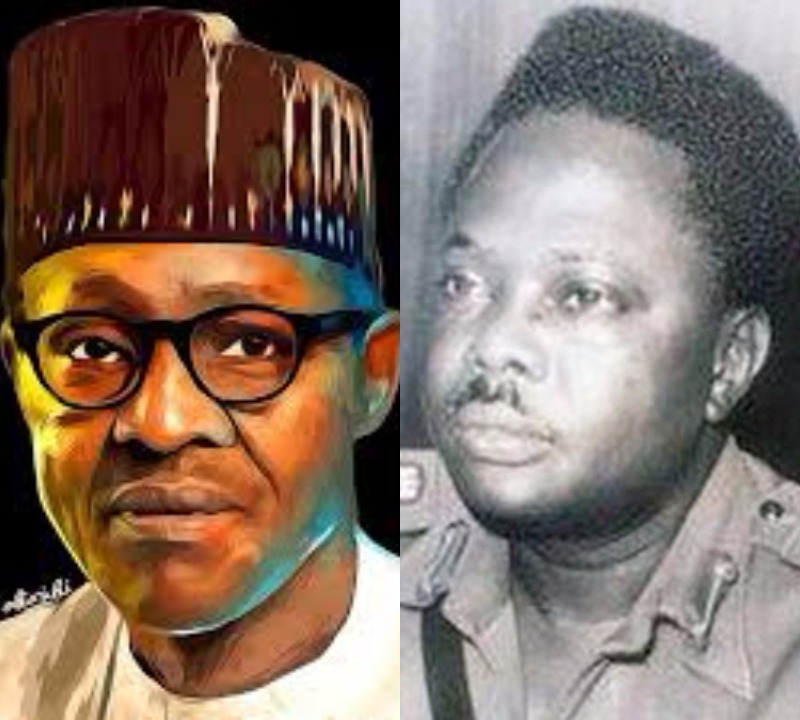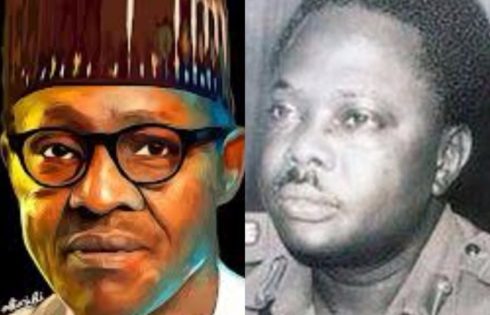

President Muhammadu Buhari is clearly in over his head when it comes to managing the economy and people of a complex country like Nigeria.
The economy is in a tailspin, and Buhari has allowed some security challenges to fester and stocked others through empty martial bluster. We should have seen this tendency in Buhari. It is not entirely our fault however.
Like the narrative of Murtala Mohammed’s competence and incorruptibility, the myth of Buhari’s clear-sighted capacity for enlightened governance derived not from evidence from his earlier regime but from the fact that he was not in power long enough for his errors of judgment and governing deficits to achieve their full, devastating impact on regular Nigerians.
Two days ago in Abuja, I hung out with a friend from our BUK days. Our discussion inevitably touched on Buhari and the current wave of disappointment with his stewardship on the economic front. We talked about how awful it must be for the president’s Southeast and South-South supporters to be taunted by their kinsmen under the current climate of near-total economic collapse, hunger, unprecedented inflation, and general hardship.
In explaining Buhari’s confused improvisations on the economy, we floated several hypotheses, but my friend introduced an angle that is not often included in the menu of explanations for our souring love affair with Buhari. He piggy-backed on a point made by historian Max Siollun about Murtala Mohammed. Siollun had noted that Murtala’s death is responsible for elevating the former military head of state to a near-mythical status in Nigeria’s political discourse, which is riddled with nostalgia for Murtala’s tough, anti-corruption regime. That nostalgic narrative now enjoys its own independent existence on the national discursive stage, rarely challenged and rarely scrutinized.
Murtala, Siollun, argued, did not rule/live long enough to manifest the inevitable errors of military men who try but often fail to manage a complex society like ours with a regimented military philosophy of command and control. Military people are rarely able to rise above their training, training being different from education and enlightened problem solving.
Did Nigerians accord Buhari the same nostalgic, retrospective messianism, leading them to exaggerate his capacity to govern effectively, my friend wondered. Like Murtala, Buhari ruled for a short time. He manifested some errors common with military folks, but he did not rule long enough for his overarching deficit of governing capacity and temperament to emerge in sharp relief.
As a result, even though Nigeria’s elites celebrated his ouster and considered his policies outmoded, many regular Nigerians were ambivalent. Some yearned for the order and discipline, real and imagined, that Buhari’s regime brought to the country after years of chaotic and kleptocratic civilian rule. The regime’s brevity left them yearning for more of its regimented control after being exposed to the relatively lax approach of Ibrahim Babangida. In comparative juxtaposition to IBB’s regime, Buhari’s rule acquired a new imaginary image and many Nigerians who thought they hated being corralled and infantalized by Buhari’s soldiers and policies somehow came to realize that a strong man was in fact what Nigeria needed.
This retrospective rehabilitation of Buhari’s military regime was largely aspirational, more a product of disillusionment with Babangida than an unqualified endorsement of Buhari. Nonetheless many Nigerians began to miss what they thought they hated as corruption and indiscipline became national pastimes. Because Buhari did not rule long enough for the full consequences of his draconian rule to manifest, he was reimagined positively in the public consciousness, his regime repositioned mythically as a time of competent governance. This myth only grew as Nigerians compared Buhari’s regime to its predecessor and successor.
I concurred with my friend’s conjecture, quipping that in fact a whole myth grew around Buhari’s short military regime, a public narrative which papered over several of the General’s misdeeds and deficiencies and which expanded in correspondence to the governing disasters of the post-1985 period. Between 1999 and 2015, as the PDP systematically frittered away the nation’s resources and undermined whatever institutions of public restraint they encountered, a cottage industry grew around what one might call the Buhari counterfactual.
Many Nigerians wondered aloud what Nigeria would be like if Buhari’s military regime had not been overthrown. Soon, people were filling in the blank, mostly with fantasies that had little correlation to what Buhari did or failed to do as military head of state. If Buhari had not been overthrown by the bad, evil Babangida, so the narrative went, we would today be another South Korea.
If he had not been overthrown, corruption would today be a thing of the past. If he had been allowed to rule longer…bla bla bla. The speculative counterfactuals proliferated infinitely. These counterfactuals in turn led people to overstate Buhari’s governing acumen and to understate his governing deficits. They also activated Nigerians’ legendary capacity to forget the past, forgive its shortcomings, and engage in nostalgic mythmaking.
Until 2015, when it became plausible to imagine him as a civilian president, people were speaking of Buhari as some often speak of Awolowo: the best president Nigeria never had. But Jonathan’s misadventure in power magnified Buhari’s mythical competence, whitewashed his inadequacies, and enabled his victory in last year’s elections.
Which leads me to the point I made even in agreeing with my friend’s thesis: that Jonathan’s misrule made Nigerians desperate for any alternative and that desperation usually leads to the suspension of critical judgment, to cognitive dissonance.
With Buhari floundering, improvising aimlessly in several zones of governance, and generally looking confused and ill-prepared for Nigeria’s many challenges, some of his supporters are now saying that it would have perhaps been better if he never won, if he remained the imagined messiah that never got a chance to save the nation. That, they argue, would have preserved the myth of his competence. It would have maintained the illusion that he is the best president Nigeria never had.
I have personally heard this from a couple of people who claim that political exigencies, the intricacies of power, and elite manipulations have soiled Buhari’s reputation, exploded the myth of his messianic abilities, and exposed him as a prisoner of power and as just another politician.
Some of these devotees never even wanted Buhari to run for the presidency in 2015, believing that power would dilute the purity of Buhari’s moral capital. They would have preferred for him to remain the philosopher and custodian of political morality in Nigeria they imagined him to be, a transcendental figure unmoored to and above the messy contestations of politics and the complicated art of governance.
To be sure, Buhari has done well in combating Boko Haram, all things considered. But even here, in the area of security, he has managed to complicate matters by stocking trouble in the Niger Delta through unnecessary belligerence, bluster, and tone-deaf indifference to the deliberative potentials of resolving the lingering issues in the Delta. He has also opened another potential security challenge by sending our undisciplined, trigger-happy army after unarmed IPOB demonstrators while allowing well-armed Fulani herdsmen to murder and plunder unchallenged.
His anticorruption actions have sent chills down the bodies of familiar suspects, even if the razzmatazz of showy arrests has not been matched by effective prosecution and the actions taken so far are clearly lopsided against the opposition and rebellious APC members. Even so, the arrests and investigations seem to be having a deterring effect in elite political circles. How long this deterrence will last and whether it will be institutionalized in policymaking remains to be seen.
In these territories then, Buhari’s scorecard is either incomplete or mixed.
On the economy Buhari’s record is less ambiguous. He seems to be experimenting, groping for a working formula, at the expense of Nigerians. This is unacceptable for a man who ran for the presidency for more than a decade, all the while projecting the image of someone who had reflected on the various facets of the Nigerian predicament and crafted ready-to-go ameliorating programs with input from experts and insights from the pragmatic lessons of global interconnections.
During his campaign for the presidency, he would frequently invoke a Hausa adage to make the point, a rather self-assured and even arrogant one, that if people didn’t vote for him, they would feel the consequences in their bodies — in other words, they would miss out on the plans and programs he had prepared for improving their lives and this loss would reflect on their bodies in the form of hunger and other bodily adversities. He was making a statement about his solid preparedness for the job. Alas, these plans have not materialized and now seems never to have existed. In the economic realm, he seems to be making them up as he goes. Now, as hardship bites harder, many of his northern supporters have sarcastically inverted that adage to say: yes, we’re now feeling it in our bodies.
Buhari’s trial-and-error, seemingly impulsive and changing economic, monetary, and fiscal policies have made uncertainty a byword of the Buhari economy. This has led to stratospheric speculation, inflation, loss of confidence, and an economic contraction that has taken Nigeria to the cusp of recession. Nigerians are the guinea pigs in Buhari’s vast economic laboratory, bearing the pain of his confused waffling in the economic domain. The manufacturing sector, which seemed to be stuttering back to life before Buhari took power, is now comatose, decimated by import and foreign exchange restrictions that harken back to the command and control economic management principles of a different era.
What’s more, rather than improving, social infrastructure, such as electricity, has regressed from their pre-2015 levels.
The first rule of politics they say is “do no harm,” which is to say that whatever you do as a leader you should not make things worse. Buhari’s policies have clearly worsened Nigeria’s economic conditions and damaged its prospects even though the price of oil has stabilized and has ticked up sporadically since he took power in 2015. You can be forgiven for not making things better, for not turning things around, but it is unacceptable for a leader to deepen the rot he inherited, to further mess things up and increase the suffering of Nigerians through the implementation of draconian restrictions.
He has picked new fights and stoked new tensions and crises in the Niger Delta and in the Southeast, even as he is praised for getting a handle on Boko Haram in the Northeast. He has done real harm in some sectors while bringing modest relief in others.
Buhari is breaching the first rule of politics, at least in the realm of economic management. He has made things worse, done more harm. It betrays a lack of preparedness on his part. It also demonstrates an absence of rigorous debate, research, and thoughtful policymaking in the government.
Moses E. Ochonu
[email protected]
